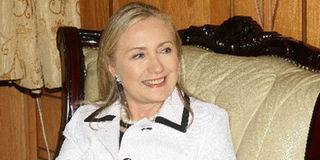Terror ranked top of Clinton agenda

United States Secretary of State Hillary Clinton at Parliament of Kenya on August 4, 2012. Photo/BILLY MUTAI
What you need to know:
- Mrs Clinton says the US will work with Kenya to improve security in refugee camps and to create conditions to entice Somali refugees to return home
The war against terrorism and the general insecurity in the Horn of Africa was among the key issues in the special message US Secretary of State Hillary Clinton delivered to Kenya from President Barrack Obama, the Nation was told on Monday.
Although the controversy surrounding free and fair General Election was the most pronounced issue from President Obama’s administration to the coalition Government, inquiries by the Nation reveal that insecurity ranked top on her agenda during the visit to Africa.
President Kibaki said that Kenyan troops together with AMISOM forces were making good progress to stabilise Somalia to enable the over 700,000 refugees who have posed serious social and security risk to Kenya, to relocate back to the liberated parts of their country.
President Kibaki in a statement after meeting Mrs Clinton urged the US to play a lead role and mobilise the international community in the re-construction of a peaceful and secure Somalia.
Another statement from Prime Minister Raila Odinga after meeting the US Secretary of State said the issue of peace and security in Somalia and the Sudans was discussed.
According to the PMPS statement, Mrs Clinton said the US will work with Kenya to improve security, particularly in refugee camps and to help in creating conditions in Somalia to entice refugees to return home.
Mrs Clinton who met President Kibaki and Prime Minister Raila Odinga separately on Saturday sought assurance that Kenya’s next elections would be free and fair.
During the meetings in Nairobi, Mrs Clinton is understood to have emphasised the need for the government to put measures in place for a democratic election and avoid a repeat of the deadly violence witnessed four years ago.
Kenya has been pressing the Obama administration to take “Somalia as a threat to regional and international peace” and to use its leverage in the Security Council to get the UN more engaged in the lawless country.
Al-Shabaab militia
This was achieved recently when Kenya Defence Forces that crossed into Somalia to fight Somali militant group Al-Shabaab that has staged a series of terror attacks in Kenya was absorbed into African Mission in Somalia.
According to a briefing from the US State Department, Mrs Clinton said she was impressed by the role played by AMISOM in trying to restore law and order in Somalia.
“Three years of diplomacy in this area looks like it is taking off, and that diplomacy has also been aided quite significantly on the ground by the AMISOM,” she said.
She said AMISOM had effectively defeated and driven Al-Shabaab out of all of Mogadishu and had taken significant parts of the country back to the North.
Without a government for nearly 20 years, Somalia is overrun by clan and Islamist militias, some of them allied to Al-Qaeda, and have been used to launch attacks against US interests in the region.
The US has in the recent past issued travel advisories warning of a possible terror attack against its interest in Kenya sparking protests from the Government.
Two Iranians were arrested in Nairobi suspected to be part of a Tehran-sponsored terror network that planned attacks on Western interests including US installations.
The Iranians led police to a hideout in Mombasa where they seized 15kg of RDX, an explosive material for making bombs.
The two Iranians — Mr Ahmad Abolfathi Mohammed and Mr Sayed Mansour Mousav — are in custody.
On the Somalia issue, Nairobi has also wanted Washington to add Mogadishu to its list of priorities in the region and to stop paying lip service to the risk that the “reservoir of terrorism” that Somalia presents.
Officials here now see Al- Shabaab, the most powerful Islamic Somali militant group, as an immediate security threat, not because of its capacity on the battlefront, but because of its influence on moderate Muslim populations throughout the Eastern coast of Africa.
Mrs Clinton’s Africa tour was seen by security experts as part of a US move to enhance closer relations with countries like Uganda and Kenya, which are playing key roles in helping to restore stability in war-torn Somalia.
Mrs Clinton said Somalia’s leaders had made progress towards meeting the August 20 deadline of establishing a new government.
She met Transitional Federal Government, President Sheikh Sharif Sheikh Ahmed, and other Somali leaders in Nairobi, during a seven-nation African tour.
The Horn of Africa country has been without democratically elected government since warlords toppled President Mohamed Siad Barre in 1991.Mrs Clinton was optimistic that a new government will be elected by the August 20 deadline.
“It will be a significant step forward in helping to end two decades of civil strife and unrest in South Central Somalia,” she said.
On relations between Sudan and South Sudan, Mrs Clinton is said to have made the two countries agree on an oil sharing deal.
“The Secretary went to Juba in order to use her diplomatic influence and credibility to strongly encourage President Salva Kiir and the leadership of the South Sudan Government to embrace an acceptable and reasonable agreement that would bring to an end one of the most difficult and thorny issues left unresolved prior to that government’s independence from Sudan. She achieved that,” a statement from State Department said.
Oil revenues has been at the centre of conflict between South Sudan and Sudan and was one of the unresolved issues in the Comprehensive Peace Agreement.
Piracy is also another issue Kenya has wanted the US to play a key role in, as it is slowly squeezing regional economies due to high shipping costs, although some 150 warships from navies across the world are patrolling the seas off Somalia. Piracy has increased despite their presence.



